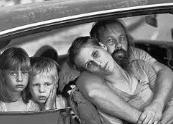 Different views on church car camping rule in Portland
Different views on church car camping rule in Portland
Oregon Faith News Note:
Portland City Council has been working towards approval of a one-year pilot program allowing limited camping in cars located in certain church parking lots. The City of Eugene allows for some car camping for churches and business parking lots. The Portland rule allows up to four cars.
Concerns by the Oregonian Editorial Board:
Some churches are already going the extra mile to help the homeless. In 2010, Eastminster Presbyterian allowed the nonprofit organization Human Solutions to set up a winter warming shelter inside the church. If the net effect of the City Council’s action Wednesday is to encourage more churches and other agencies to provide shelter — real shelter — then perhaps the fringe benefits of this experiment will outweigh its risks. But the risks strike us as very real, indeed, and very grave. What about the danger of carbon monoxide poisoning if car engines are running for hours at night to provide heat? How will churches that agree to supervise car camping — and allow restroom use at night — ensure that tolerance for car camping doesn’t slip into a tacit encouragement of it?
How will the city ensure that relaxation of the rules doesn’t promote another Dignity Village or Occupy Portland-type encampment? Occupy proved dangerous as well as difficult and expensive to remove.
These are sad, desperate times for many Oregonians. And this is a sad and drastic step for the city to take, the city that once promised to “end homelessness.” Tolerance of car camping shows how far we haven’t yet come toward a solution.
Comments by Portland Commissioner Nick Fish:
“This resolution does not solve the problem, But when people of good faith come to us and ask us to do something, I think we should agree. It is not intended to solve the problem or be comprehensive in scope.”
Oregon Ecumenical Ministries statement
“By offering a safe and secure site for overnight sleeping—complete with access to restrooms, temporary storage space, possibly showers and other services—those who discover the congregation’s hospitality will have more stability in their lives and be in a better position to begin the move from being homelessness into permanent housing. Additionally, congregations who become hosts will develop important relationships with people who are homeless, whereby enhancing the faith community’s understanding of the complex aspects of homelessness. Long-term, our hope is that through these encounters, more faith communities will support the development of more permanent housing and be active partners in providing additional resources that will reduce the level of homelessness in our community. Toward these ends, EMO is ready and willing to co-sponsor training and education forums to ensure successful implementation of the pilot project and to enhance faith-based participation in programs and initiatives to serve those people who are homeless and seeking long-term, affordable permanent housing.”
Disclaimer: Articles featured on Oregon Report are the creation, responsibility and opinion of the authoring individual or organization which is featured at the top of every article.


